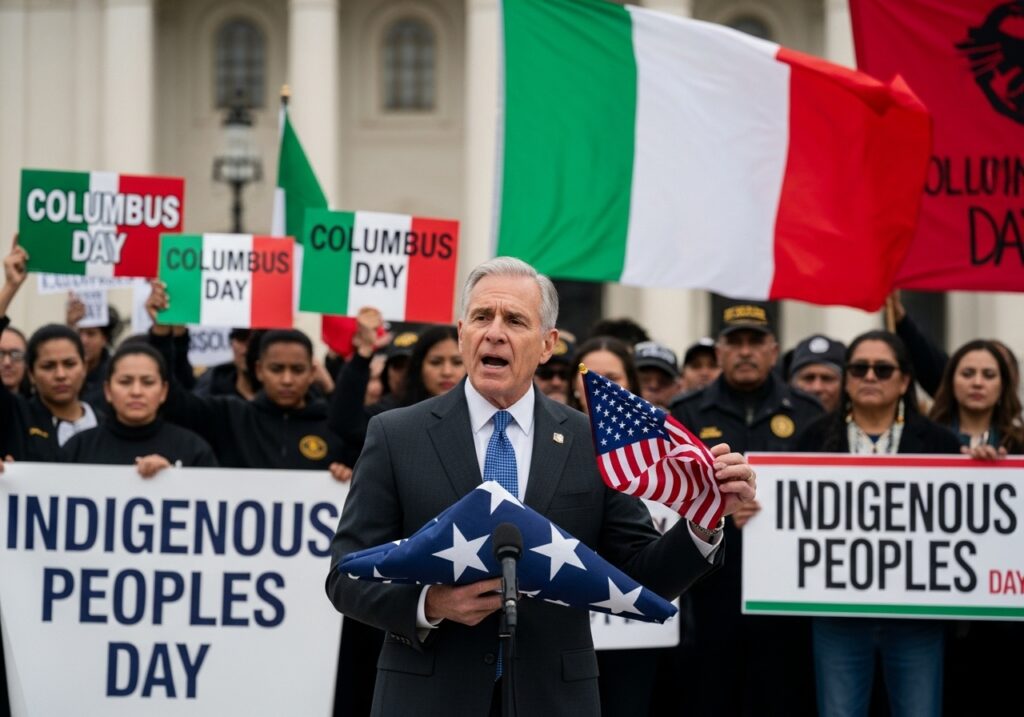Did Congress really just try to punish cities for swapping Columbus Day with Indigenous Peoples Day? That’s the claim making waves on social media, and it’s got a lot of people talking. So let’s break it down and sort out what’s true, what’s political spin, and what it all actually means.
This all started with a new bill introduced by Republican Congressman Michael Rulli of Ohio. Rulli’s bill would do two things: first, it would officially reaffirm Columbus Day as a federal holiday. Second, it would withhold certain federal funding from cities and states that have stopped celebrating Columbus Day and replaced it with Indigenous Peoples Day.
Now, that might sound harsh to some, but Rulli says this isn’t about disrespecting Native Americans. In fact, he says he supports creating a separate day to honor Indigenous people. What he doesn’t support is removing Columbus Day and replacing it with something else.
“This is about every son and daughter of Italy,” Rulli said in an interview, “everything that makes our culture who we are, from Philadelphia to San Francisco.” He pointed out that many Italian Americans see Columbus Day as a celebration of their heritage—not just about the man Christopher Columbus, but about their community and history in America.
To understand where this bill is coming from, we need to go back in time. Columbus Day became a national holiday in 1937, but it was first celebrated more widely in the late 1800s. One reason it was created was to honor Italian Americans, who were facing a lot of discrimination at the time. In one tragic event in 1891, eleven Italian immigrants were lynched in New Orleans after being wrongly blamed for a crime. The holiday was partly meant to help heal that wound and bring respect to the Italian American community.
Fast forward to 2021. That’s when then-President Joe Biden made headlines by recognizing both Columbus Day and Indigenous Peoples Day on the same date—the second Monday in October. Progressive activists and some historians supported this move, saying Columbus should not be celebrated because of how his arrival led to the suffering and deaths of many Native Americans. They argue that Indigenous Peoples Day is a more respectful way to remember history.
But not everyone agreed. Many Italian Americans saw this as erasing their culture and felt betrayed. Rulli says Biden’s move hurt both communities by lumping them together on the same day, instead of giving each one its own space to be honored.
President Donald Trump, on the other hand, has taken a strong stance in support of Columbus Day. Just last week, he signed a new proclamation officially declaring October 13th as Columbus Day. Rulli praised Trump for what he called a “wonderful olive branch” to Italian Americans.
So what does Rulli’s bill actually do? It doesn’t cancel Indigenous Peoples Day, and it doesn’t stop cities from recognizing Native American history. But if a city or state chooses to stop celebrating Columbus Day and fully replaces it with Indigenous Peoples Day, they could lose some federal funding. That’s what has critics up in arms.
Supporters of the bill say this is about protecting long-standing American traditions and respecting the contributions of Italian Americans. Opponents argue that cities should have the freedom to choose which holidays they recognize, especially when it comes to telling the full story of American history.
Rulli insists he’s not trying to offend anyone. “Native Americans are some of the most amazing, dynamic cultural people that make up the fabric of America,” he said. “They deserve their own day. We will get them their own day, but not Columbus Day.”
In the end, this debate is about more than just a holiday. It’s about identity, history, and who gets to decide which stories we tell. For now, Rulli’s bill is still working its way through Congress. Whether it passes or not, one thing is clear: the battle over Columbus Day isn’t just about the past—it’s also about what kind of country we want to be in the future.

